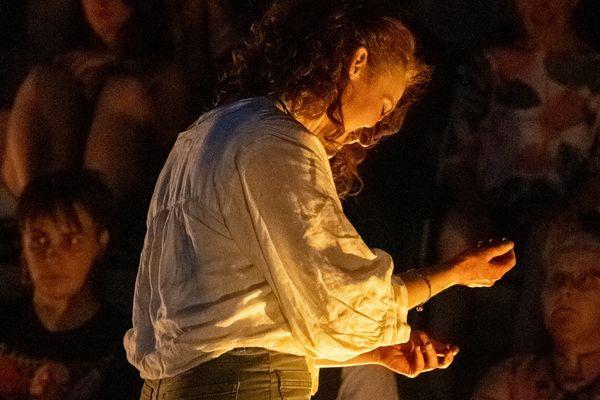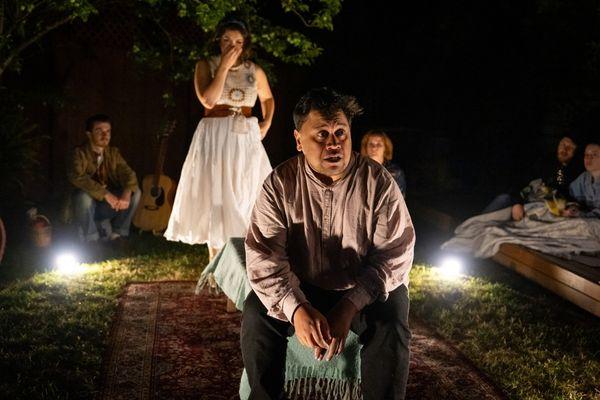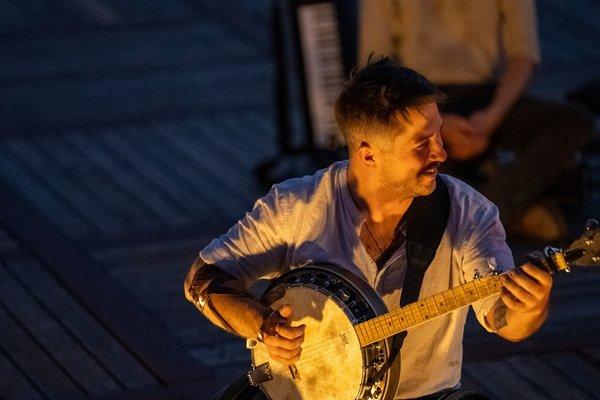It's Shakespeare like you’ve never seen it before – fiery, fearless, and fuelled by folk music.
After an epic 90-show tour across New Zealand and Australia, The Barden Party (real-life couple Ollie Howlett and Laura Irish) lands in Melbourne for a short but striking run at Chapel Off Chapel. Their latest double bill blends bold gender-swapping, Southern Gothic flair, and a whole lot of sass in 'Macbeth – A Sassy, Sexy, Bluegrass Twist', paired with a dynamic reimagining of 'Romeo & Juliet'.
The same cast jumps between both productions – a theatrical feat in itself – bringing Shakespeare’s timeless tales roaring into a world of swagger, soul and rebellion. 'Macbeth' in particular flips the script entirely, casting Queens as Kings and reframing power through a fierce, unapologetic lens.
Laura Irish and Ollie Howlett lead the charge as Macbeth and Lady Macbeth respectively, commanding the stage with electrifying intensity and undeniable chemistry.
Before they take to Chapel Off Chapel with this fierce double bill, and then zoom off to the Edinburgh Festival Fringe with 'Macbeth', we caught up with them to talk power, passion, and turning the Bard on his head.
You're serving up two Shakespearean heavyweights with music, sass and Southern Gothic swagger — what made you decide to present these two shows as a double bill?
LAURA: We’ve always toyed with the idea of having one cast that can do two or more shows. We love the vibe of being traveling troubadours with a bunch of stories and characters up our sleeves. And after trialing our methods and style for a few years, we realised that 'Romeo & Juliet' and 'Macbeth' are our signature shows. They’re so different but the method we’ve used to devise them is the same and they have become so beloved across New Zealand and parts of Australia that we weren’t ready to let them go. We like the idea of what it might unlock in us as actors and the audience to perform and to see our versions of these shows back to back. It’s an interesting experiment.
OLLIE: 'Romeo & Juliet' has always been one of my favourite shows, and my favourite of our shows – it’s the first show I was heavily involved in the creation of from conception to finish. Ever since we finished our 23/24 tour of 'R&J' I’ve missed getting to say the lines and sing the songs, so when we were pitching 'Macbeth' to Chapel Off Chapel and they seemed interested in both 'Macbeth' and 'R&J', I jumped at the opportunity to get to put 'R&J' on again, even if it meant us being given the huge task of performing to separate shows back to back, night after night. Both of these shows just have something magical about them, and being able to share that with audiences over two shows each night I think will be something truly special.

The Barden Party has a real flair for bold twists — what’s your personal philosophy when it comes to reimagining Shakespeare? Where’s the line between reverence and rebellion?
LAURA: When it comes to the language, I’m more of a traditionalist than Ollie. I like the iambic pentameter in tact and I love that Shakespeare wrote for actors. I could nerd out on it for ages. But my main goal is to take what people think of as 'elitist, dusty old, white guy colonialism Shakespeare' that is out of reach or out of touch and bring it back to the essence of the stories and themes that are so innately human, Shakespeare for everyone. To do that, it needs to be understandable, performed by actors who are connected, down to earth and can make the audience feel welcome and at home in our space. The characters need to be relatable, the relationships need to be believable and relevant. We take a few thematic liberties and change relationships or combine characters but making our versions of Shakespeare rebellious, is exactly what makes them reverent to the person that wrote them. It’s bold to say, but I think Shakespeare himself, would have a bloody good time at our shows.
OLLIE: When it comes to Shakespeare, I sit in quite a funny place. While I love the original works and think that they have a timeless place in the history of theatre, I think that there is nothing better than re-examining a work and looking at it through new lenses. Everything we do, every change we make, is rooted in the source material, and how we can honour it while still re-working the work to better play on a modern pallet.
Audiences can catch both shows in one go – same cast, two totally different worlds. What’s the vibe shift like behind the scenes?
LAURA: I imagine it’ll be a joyful whiplash, an emotional rollercoaster. We actually have no idea because we haven’t done it yet. But resetting into 'Macbeth' after 'R&J' will be very interesting. I’m really looking forward to it. We add so much lightness into our shows which make the darkness hit even harder for some people. I think having both the shows back to back will highlight this even more.
OLLIE: I think that’s one of the most exciting elements of putting these shows on up next to one another. Feeling how one show influences the other. We haven’t done a double bill like this before, so it’s all new ground for us. I can’t wait to see the way the two shows play together, what parts play off of each other, how they mirror each other, and how they seperate themselves as completely different worlds. Behind the curtain, I think there will be a lot of new discovery in the first couple of runs we have with both shows back to back, not just from a textual sense, but also just in how we have to manage ourselves in the changes, this double bill after all will definitely be more marathon than sprint.
Laura, you're stepping into Macbeth's boots — and they're bloody. What’s it been like sinking your teeth into a role so iconic, and flipping the traditional 'power couple' dynamic on its head?
LAURA: It was very daunting at first and I have had a lot of surprised people (particularly older white men in the audience) when I step forward as Macbeth, as most people assume as their coming in and the cast is greeting them at the top of the show, that I’ll be playing Lady Macbeth. Most of them even say so prior to the show and I just say “well, you’ll have to wait and see!" Haha. I can honestly say that out of my entire career, Macbeth is the character that I’ve played that I’ve been the most terrified that I’ll be judged because people will think I’m not right to play the role but I’ve identified with this character the most, which has created such an empathy that I know the audience can see because it has been noted so many times by audience and reviewers. Macbeth is kind, a good friend, a chronic people pleaser, loves their partner to a fault, ambitious, brave and then makes some very bad, irreparable decisions and can never go back. I think we’ve all been there to some extent. When I play a character or cast a character for our shows, I list the characteristics and remove the gender and decide who is best to portray that person, with Macbeth, I have grown to understand Macbeth so in-depth after 90 shows. Also, it helps that our sword fight is epic and I LOVE to sword-fight. With me being a woman version of Macbeth, the character doesn’t change, the audiences own biases inform their feelings of the character and for some, it takes a minute to adjust to the change of it usually being played by a man and now being played by a woman. But I’m here to play out the relationships, the story and to be honest in my portrayal of this character’s unfortunate demise, I’m not here to unpack the biases that people enter the theatre with, that’s their and their therapist's job. I think what we’ve learned with this flipping of the show, because I’m not the only change (all the Kings are Queens and the witches are hillbilly brothers) is that if you play the relationships honestly and genuinely, the audience releases their preconceived ideas pretty quickly. And as far as the couple, the 'screw your courage to the sticking place' argument was one to balance because with the gender change, we were aware that it strangely did come across as even more abusive for that push to come from a man.

Laura, Macbeth is usually this brooding male antihero – how did you shape your version, and were there any moments where you thought, “This hits completely differently with a woman in charge”?
LAURA: This is a continuation of the above, but in our version we alter the language EVER so slightly in one scene (we take some editing liberties) and the outcome is that myself as Macbeth says “I do all that may become as a man, who dares do more is none”. And the response is basically: you have to prove yourself even more if you want to be respected as much as a man. It cuts deep but it also feels pretty real life. We’ve discovered so much about what our show says about power dynamics, especially with women at the helm. I know I’ve felt so much of this without saying it in my real life.
Ollie, you’re playing Lady Macbeth. What excited you most about stepping into her shoes, and what surprised you about the character once you did?
OLLIE: 'Macbeth' was a play that I wasn’t hugely familiar with coming into the creation process. I knew Laura loved the play, and I trust her judgement, so I just dove in to all aspects of it with her. Lady Macbeth is a character who holds such a powerful space in the theatrical zeitgeist, and I had always heard stories told of other actors portrayals, all of them sounding, not only incredibly moving or terrifying, but also all of them feeling distinct from each other. For such a small role, really only taking up space in a handful of scenes, the character provides such a force for the story. I think that’s what both surprised me about the character, and excited me the most – how can build on what’s been done before, while still making it my own, and in such a minimal amount of stage time.
Ollie, you’ve said, “We didn’t just swap genders – we flipped the power structure and watched it burn”. What does that look like in action? Can you give us a taste of the chaos?
OLLIE: When we decided to swap the genders of the Kings in 'Macbeth', I honestly thought it wouldn’t be that big of a deal to audiences. I mean, at the end of the day, very little of the actual story has anything to do with actually physically being a 'man'. While there are plenty of moments where gender stereotypes in the text are used to either bolster someones confidence or tear someone down, none of it actually hinges on the gender of the actor. So when we started performing the show to audiences, it wad really fascinating to me the way that people reacted to the change of the gendered power structure within the play. Particularly the way men reacted. Some have found it quite confronting to see just how fragile the patriarchal structure is, and that when it comes down to it the only thing that really stops them from being able to believe that a woman can hold space and authority is their own personal prejudices. We thought we were just swapping genders when we started the process, but it really turned into something bigger than that as we got to hear feedback from the people watching the work, whether that be people struggling with being confronted by such a simple shift in power dynamic, or seeing the way the change positively reinforces some of our younger audience members.
Your productions are bursting with bluegrass and folk. How do you find the perfect musical mood for murder, mayhem, and forbidden love?
LAURA: It is crazily strange how much the themes of bluegrass and Americana music fit 'Macbeth'. Stories of revenge and betrayal. Blood, tears, whisky, travel, love. The songs have just slotted in pretty seamlessly. And with 'R&J', using kiwi and Australian music has really delighted audiences across both countries. It really connects the audience to us as performers and the experiences of our shows feel really intimate when people feel comfortable singing along to the music with us.
OLLIE: I find that Shakespeare lends itself to music. The characters are so large and brimming with emotion that it feels almost natural for moments to break out into song. Shakespeare is a type of theatre that can often be confusing for audiences to follow, so as we go through a script adaptation, we try to sign-post the emotional beats of the story, and then inject music to keep audiences following along and invested in the characters. The only challenge can be finding songs with lyrical content that fits within the story, as I don’t like having the shows feel like a typical jukebox musical, which is where bluegrass and folk music really lend themselves to the cause. Both of those genres of music come from such rich storytelling traditions that with a little bit of new context surrounding them, they really take on a life of their own in our shows.

After lighting up New Zealand and Australia, you're about to take ‘Macbeth' to the Edinburgh Fringe. What does that international debut mean to you – and what are you most looking forward to about it?
LAURA: It’s scary and exciting. It costs A LOT of money. But it could mean the company getting seen and recognised on a bigger international stage. Our shows don’t come with a lot of bells and whistles. Intimate, vulnerable, soul-bearing, joyful with JUST the acting and music. We have nothing to hide behind when we perform and we’re all on stage all the time. We are just a small Kiwi theatre company surviving and putting on work that puts audience experience and connection first and foremost. We’re looking forward to sharing this in the UK and hoping they love it and connect with us just as much as Australian audiences have and the best case scenario, someone sees it the can help us connect to more opportunities.
OLLIE: It’s an absolute dream come true. Making such a big international debut with a show that we are so truly proud of is a huge deal to us. It is however a whole lot of work. We are a small team working countless hours to try to put everything together, so even now just seeing some of the fruits of that labor come to is really cool to witness. I think what I’m most looking forward to is just being in and amongst an arts festival like Edinburgh Fringe, it’s the largest arts festival in the world, and just to get to go and be in a place that has kicked off so many incredible show runs and artists careers is so exciting.
You’ve toured private gardens, played festivals, and now you're storming Chapel Off Chapel. What’s been the most unexpected or wild moment on tour with The Barden Party so far?
LAURA: The most unexpected and wild was in 2023, we’d just finished a 60-show run of rockabilly 'Much Ado About Nothing' when a private sponsor gave us the funding to write, develop and perform an original, fully immersive 1920s theatrical experience based on a true story, on an art deco super yacht in Auckland viaduct, which we performed for 11 weeks. But he only gave us 3 weeks to create the entire thing. It was a whirlwind, it was a show concept and idea that I had in my back pocket with my friend from Sydney and the opportunity just dropped in our laps and we had to run with it. Huge risk, major reward. It was so successful and audiences absolutely loved it. We dropped everything and went to Auckland immediately and created this show, 'Butterfly Smokescreen', which was the highlight of my professional career and my life. We’re currently searching for a super yacht for our venue to produce the show in Australia. But that was the craziest things that’s happened to us. We went straight from that into 'Romeo & Juliet'. So we haven’t really stopped touring for over two years.
OLLIE: On our most recent tour of 'Macbeth', we had the opportunity to play with a band who wrote one of the songs in the show which was pretty wild. We connected with a Kiwi band called Albi & The Wolves when I was applying for the rights for the songs we wanted to use, and they were just as excited as we were to have the song in the show, and after a bit of back and forth – 90 shows later – they came along to one of our closing performances in New Zealand and got up on stage to perform their song 'This Is War' with us to close out the show. Then a couple of weeks later, we went along to their live performance recording session, and they asked us to get up to play 'This Is War' with them. They are such an incredibly talented group of people, so to connect with them through the show and through their music was really special for us!
The Barden Party's Shakespeare Double Bill plays Chapel Off Chapel (Melbourne) 27 May-1 June.

